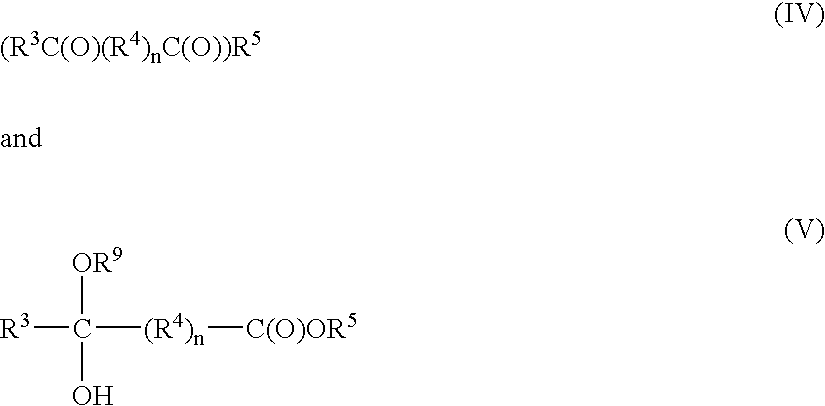Quaternary Ammonium Salt Detergents for Use in Fuels
a technology of ammonium salt and detergent, which is applied in the direction of fuels, organic chemistry, lubricant composition, etc., can solve the problems of poor fuel economy, high emission, and component deformation of liquid fuel during engine operation
- Summary
- Abstract
- Description
- Claims
- Application Information
AI Technical Summary
Problems solved by technology
Method used
Image
Examples
example 1
[0070]Reaction product of Preparatory Example A, styrene oxide (12.5 grams), acetic acid (6.25 grams) and methanol (43.4 grams) are heated with stirring to reflux (˜80° C.) for 5 hours under a nitrogen atmosphere. The reaction is purified by distillation (30° C., −1 bar) and gave a water white distillate. The resulting compound is a styrene oxide quaternary ammonium salt.
example 2
[0071]Reaction product of Preparatory Example A (373.4 grams) is heated with stirring to 90° C. Dimethylsulphate (25.35 g) is charged to the reaction pot and stirring resumed (˜300 rpm) under a nitrogen blanket, exotherm raises batch temperature to ˜100° C. The reaction is maintained at 100° C. for 3 hours before cooling back and decanting. The resulting compound is a dimethylsulphate quaternary ammonium salt.
example 3
[0072]Reaction product of Preparatory Example A (1735.2 grams) is heated with stirring to 90° C. under a nitrogen atmosphere. Benzyl chloride (115.4 grams) is added drop wise maintaining reaction temperature at 90° C. The reaction is held for 5 hours at 90° C. The resulting compound is a benzyl chloride quaternary ammonium salt.
PUM
| Property | Measurement | Unit |
|---|---|---|
| Fraction | aaaaa | aaaaa |
| Fraction | aaaaa | aaaaa |
| Fraction | aaaaa | aaaaa |
Abstract
Description
Claims
Application Information
 Login to View More
Login to View More - R&D
- Intellectual Property
- Life Sciences
- Materials
- Tech Scout
- Unparalleled Data Quality
- Higher Quality Content
- 60% Fewer Hallucinations
Browse by: Latest US Patents, China's latest patents, Technical Efficacy Thesaurus, Application Domain, Technology Topic, Popular Technical Reports.
© 2025 PatSnap. All rights reserved.Legal|Privacy policy|Modern Slavery Act Transparency Statement|Sitemap|About US| Contact US: help@patsnap.com



